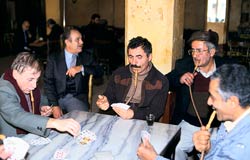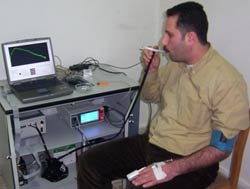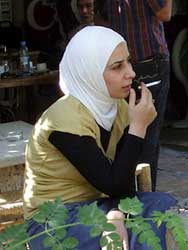US-Syrian research partnership combats smoking
February 2010 | Volume 9, Issue 1
Smoking has long been a popular pastime throughout the Middle East. Syria is no exception, where more than half the males smoke cigarettes and women are increasingly taking up the habit. Hookahs, or water pipes, are also prevalent partly because of the erroneous perception they are a "cleaner," safer way of consuming tobacco.
A U.S.-Syrian research partnership to combat the problem has supported the first-ever population surveys to determine smoking prevalence, as well as additional studies on the toxicity, dependence, the effectiveness of various cessation approaches and the impact of secondhand smoke. Information generated by the Fogarty-funded project has been used to inform the country's health policies, including a ban on public smoking.
Syria bans public smoking; Fogarty-funded research had impact
Starting this spring, it will be illegal to smoke in Syrian restaurants and cafes, campuses and offices, taxis or buses and anywhere else in public. The prohibition was issued by Syrian President Bashar al-Assad, a British-trained ophthalmologist. His father, the previous president, had also tried to restrict smoking but his efforts failed due to weak enforcement. This time, offenders will be fined 2,000 Syrian pounds (about US$45).

Photo by Curt Carnemark/The World Bank
In Syria, a public smoking ban that goes into
effect in April includes restrictions on water pipes.
In a bold move, the ban includes limitations on water pipes, which are especially popular among teens, young adults and women. Landmark Fogarty-funded research exposed the dangers and documented the prevalence of water pipe smoking in Syria.
"The inclusion of water pipe smoking restrictions in the ban is clear evidence of our direct involvement in public policy," says Fogarty grantee Dr. Wasim Maziak. Many other countries, including the U.S., exempt water pipe smoking venues from clean indoor air policies.
Fogarty director Dr. Roger I. Glass is pleased that research funded by the Center has influenced health policy, "It was gratifying to learn about the public smoking ban, knowing that the studies we funded contributed to tobacco control laws. That was confirmation that collaborative research builds bridges, which is particularly important in the Middle East."

Photo courtesy of the Syrian Center
for Tobacco Studies
The first NIH research collaboration between
the U.S. and Syria has produced data that
has informed policy decisions such as a public
smoking ban.
Fogarty funds the first-ever NIH research project in Syria
Fogarty’s presence in Syria dates back to 2002, when the first-ever NIH research collaboration between the U.S. and Syria was created in Aleppo. Initial funding for the Syrian Center for Tobacco Studies came from a five-year Fogarty International Tobacco and Health Research and Capacity Building Program grant, which has since been renewed.”
The Center might never have happened if it weren't for the vision and creativity of grantees Drs. Kenneth Ward, Thomas Eissenberg and Maziak, who met on the Internet. Ward and Maziak are both based at the University of Memphis, while Eissenberg is at the Virginia Commonwealth University.
"It was an unusual partnership from the beginning," says Ward, the Center's intervention director. "When Fogarty announced the tobacco program, each of us had an interest in applying, but none of us could do it on our own. Wasim, a native of Syria, posted a message on the Society for Research on Nicotine and Tobacco listserv, and Tom and I responded." The three began an e-mail dialogue and clicked.
The Center's immediate priority was to conduct the country's first population-based tobacco use assessment. From that point on, Center leadership regularly communicated findings about the spread and potential impact of smoking to the Syrian health authorities.
Early on, Center scientists lobbied vigorously for the ratification of the World Health Organization Framework Convention on Tobacco Control that went into effect in 2005. Their efforts led to Syria being among the first in the region to sign on and are helping Syria meet its obligations.

Photo by Bruce Northam
Nearly 57% of Syrian men smoke
cigarettes; 17% of women do, and
that percentage is increasing.
The Center proves itself
The Center established itself quickly as a leading research institution. After being in operation for less than six years, it received the prestigious 2008 Hamdan Award for the Best Medical Institute in the Arab World. The award - sponsored by Sheikh Hamdan bin Rashid Al Maktoum, the deputy ruler of Dubai - recognizes excellence in research and health education.
Center scientists have published more than 50 papers in top peer-reviewed journals, including pioneering data about surveillance of tobacco use in the Middle East and U.S., trans-disciplinary studies on the emerging epidemic of water pipe smoking, and investigations of secondhand smoke exposure and its health effects.
"We demonstrated the high prevalence of both cigarette and water pipe smoking, the dependence-producing properties of these products, especially water pipe, and the considerable amount of toxins generated by secondhand smoke from these products in Syria," says Ward.
The Center is currently evaluating cessation programs for both cigarette and water pipe smoking to determine what is most effective in this culture, and they are studying adolescent tobacco use.
The focus becomes regional
It didn't take long for the Center to extend its focus beyond Syria to the tobacco epidemic in surrounding countries. Eissenberg has also gone on to form a research collaboration in Jordan, through another Fogarty grant.
The Center has provided advanced training to more than a hundred Syrian scientists and researchers from throughout the region. This summer, regional training in Beirut will focus on research to evaluate policy implementation.
"We think this is very timely as many countries in the region are starting to perform their policy obligations under the framework convention," says Maziak. "Egypt requires warnings on cigarette packs; the United Arab Emirates, Lebanon, Iraq and Turkey have issued smoking bans. It will be very important to know not only what policies have been adopted, but whether they were successfully implemented."
To view Adobe PDF files,
download current, free accessible plug-ins from Adobe's website.